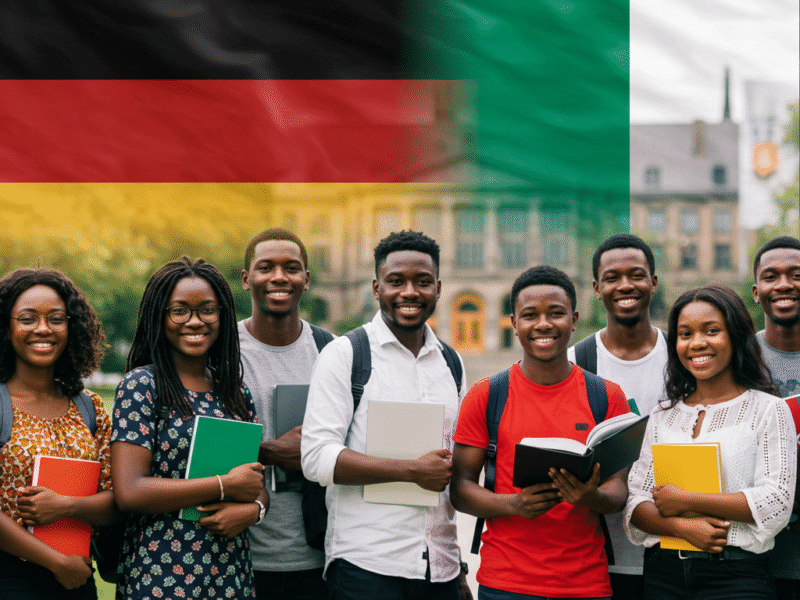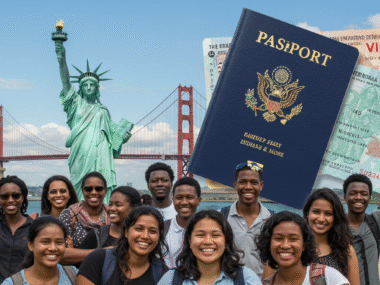Imagine waking up in a vibrant city like Berlin or Munich, surrounded by world-class education, innovative tech hubs, and a culture that values hard work and diversity—all while studying for free or with full financial support as a Nigerian undergraduate. That’s the dream many young Nigerians are turning into reality through undergraduate scholarships in Germany for Nigerians, complete with visa sponsorship opportunities. If you’re a high school graduate or someone looking to kickstart your university journey abroad, Germany offers some of the best chances to study without breaking the bank. In this guide, I’ll walk you through everything you need to know, from the top scholarships to the visa process, in a way that’s easy to follow and inspiring. Let’s dive in and make your study abroad goals feel achievable.
Why Choose Germany for Your Undergraduate Studies as a Nigerian?
Germany stands out as a top destination for international students, especially from Nigeria, because of its high-quality education system that’s often tuition-free at public universities. Think about it: you can earn a bachelor’s degree in fields like engineering, business, medicine, or computer science without paying hefty fees that you’d face in places like the UK or USA. For Nigerians, this is a game-changer, especially with the naira’s fluctuations making overseas education seem out of reach.
One big reason is the emphasis on practical skills. German universities blend theory with hands-on experience through internships and projects, preparing you for global jobs. Plus, the country is home to giants like BMW, Siemens, and SAP, so networking opportunities are endless. As a Nigerian, you’ll join a growing community—over 3,000 Nigerians are already studying there, building bridges between Africa and Europe.
The cost of living in Germany for students is manageable too. On average, you’ll need about €800-€1,000 per month for rent, food, transport, and fun. That’s roughly N1.2 million to N1.5 million, but scholarships often cover most of it. Cities like Leipzig or Dresden are cheaper than Munich, giving you options based on your budget. And let’s not forget the safety—Germany ranks high in global peace indexes, making it a worry-free place for parents back home.
But what about the language? While many programs are in German, there’s a rise in English-taught undergraduate courses, especially in STEM fields. Universities like the Technical University of Munich (TUM) or RWTH Aachen offer these, so you don’t need perfect German right away. You can learn it gradually, which adds to your resume.
For Nigerians facing economic challenges, Germany’s focus on merit-based admissions means your grades and passion matter more than your wallet. No entrance exams like SAT for most programs—just your secondary school certificate and maybe a motivation letter. This levels the playing field, allowing talented students from Lagos, Abuja, or Enugu to shine.
The Benefits of Undergraduate Scholarships in Germany for Nigerians
Securing an undergraduate scholarship in Germany for Nigerians isn’t just about free tuition; it’s a full package that transforms lives. These scholarships often include monthly stipends, health insurance, travel allowances, and even visa sponsorship support. Imagine getting €934 monthly (about N1.4 million) to cover living expenses—that’s what some fully funded programs offer.
Visa sponsorship is a huge plus. As a scholarship recipient, you’ll get a letter from the funding body proving financial stability, which is key for the German student visa. This sponsorship makes the visa process smoother, as embassies prioritize sponsored students. No more stressing about blocked accounts showing €11,208 (the required proof of funds for 2025).
Beyond money, these scholarships build your network. You’ll attend workshops, conferences, and cultural exchanges, connecting with peers from around the world. For Nigerians, this means exposure to innovative ideas that can be brought back home to solve issues like energy shortages or tech innovation.
Long-term perks? Graduates often get post-study work visas, allowing you to stay and work in Germany for up to 18 months. With unemployment low at 3-4%, jobs in engineering or IT pay well—starting salaries around €40,000 yearly. Many Nigerians return home with skills to start businesses or join multinationals like Dangote or MTN.
Health and well-being are covered too. Scholarships include insurance, and Germany’s healthcare is top-notch. Plus, the emphasis on work-life balance means you’ll have time for travel—explore Europe on weekends via cheap trains.
In short, these opportunities empower Nigerian youth, reducing brain drain by encouraging returnees with global expertise. It’s not just education; it’s empowerment.
Top Undergraduate Scholarships in Germany for Nigerians
Now, let’s get to the heart of it: the best undergraduate scholarships in Germany for Nigerians. I’ve rounded up the most relevant ones for 2025-2026, focusing on those open to undergrads. While many scholarships lean toward masters, there are solid options for bachelor’s seekers, especially through foundations and universities. Most are fully or partially funded and include visa support elements.
1. DAAD Scholarships for Development-Related Undergraduate Studies
The German Academic Exchange Service (DAAD) is a powerhouse for international students, and Nigerians are a priority. Though DAAD is famous for masters and PhDs, they offer undergraduate opportunities through programs like the “Study Scholarships for Foreign Graduates in the Field of Performing Arts” or general funding for bachelor’s in specific fields.
For Nigerians, the DAAD Undergraduate Scholarships provide stipends of €934 monthly, plus health insurance and travel costs. Eligibility? You need a strong WAEC/NECO result (at least B average), proof of English/German proficiency (TOEFL/IELTS or TestDaF), and a motivation letter showing how your studies align with Nigeria’s development.
Application opens in October for the next academic year. Visa sponsorship? DAAD letters act as financial proof, easing the student visa process. In 2024, over 20 Nigerians won DAAD undergrad spots—aim for fields like renewable energy or agriculture for better chances.
Success tip: Check the DAAD database for “undergraduate opportunities”—they include short courses that can lead to full degrees.
2. Heinrich Böll Foundation Scholarships
This green-focused foundation loves supporting Africans, including Nigerians, for undergraduate studies in Germany. It’s fully funded, covering tuition (though public unis are free), a €300-€600 monthly allowance, and health insurance.
As a Nigerian, you’ll qualify if you’re committed to sustainability, human rights, or democracy—perfect for social sciences or environmental majors. Requirements: Excellent grades, community involvement (like volunteering in Nigeria), and basic German knowledge.
Applications are twice yearly (March and September). Visa-wise, the foundation provides sponsorship letters, helping you bypass the full blocked account requirement. Hundreds of Africans benefit annually, with Nigerians making up a good chunk.
One Nigerian recipient, from Lagos, studied environmental policy at the University of Freiburg and now works on climate projects back home. It’s inspiring!
3. Konrad-Adenauer-Stiftung (KAS) Scholarships
KAS targets Christian-democratic values but is open to all Nigerians showing leadership potential. For undergrads, it offers €850-€1,200 monthly, plus seminars and networking.
Eligibility: Top secondary school results, extracurriculars, and a commitment to Nigeria’s progress. They prioritize fields like law, economics, and media.
Apply by July for the winter semester. Visa sponsorship is strong—KAS handles much of the paperwork, including fund proofs. It’s partially funded but covers essentials, making it accessible.
4. Friedrich Ebert Foundation (FES) Scholarships
Socially oriented, FES supports Nigerians in undergraduate programs, especially in social sciences, politics, or economics. Funding includes €830 monthly, books allowance, and health coverage.
Nigerians need to demonstrate social engagement—like activism or community service. Applications open in November and May. Visa help? Their acceptance letter serves as sponsorship evidence.
A cool fact: FES has supported over 1,000 internationals yearly, with Nigerians excelling in leadership roles post-graduation.
5. Deutschlandstipendium (Germany Scholarship)
This merit-based award is €300 monthly for a year, renewable. It’s open to Nigerians at any German university. Not fully funded, but combines well with others.
Eligibility: High academic performance and personal achievements. Apply through your chosen uni after admission. No direct visa sponsorship, but it boosts your financial profile.
Top unis for this: LMU Munich or Humboldt University, where internationals thrive.
6. KAAD Scholarships for Africans
The Catholic Academic Exchange Service (KAAD) focuses on Christians from developing countries, including Nigerians. For undergrads, it’s fully funded with stipends, insurance, and travel.
Requirements: Catholic background (preferred), strong grades, and a plan to return to Nigeria. Applications year-round, but early is best.
Visa sponsorship: KAAD provides comprehensive support, including fund guarantees.
7. University-Specific Scholarships
Many German unis offer their own for Nigerians:
- Technical University of Munich (TUM) International Scholarships: Up to €1,500 per semester for undergrads in engineering.
- RWTH Aachen Merit Awards: €500-€1,000 monthly for top internationals.
- University of Heidelberg Scholarships: For medicine or sciences, covering living costs.
Apply during uni admission. These often include visa guidance.
8. Erasmus+ Mobility Grants
Though not full scholarships, Erasmus+ offers Nigerians short-term undergrad exchanges (3-12 months) in Germany, with €800-€900 stipends. Great for testing waters before a full degree.
Eligibility: Enrolled in a Nigerian uni, good grades. Visa? Short-term Schengen, easier than full student visa.
More options from searches: Programs like Leadership for Africa (though masters-focused, some undergrad elements) and in-country scholarships at Nigerian unis partnering with Germany.
Remember, fully funded scholarships in Germany for Africans are competitive—apply early, tailor your essays, and get recommendations.
How to Apply for Undergraduate Scholarships in Germany for Nigerians
Applying seems daunting, but break it down. First, research: Use portals like DAAD.de or ScholarshipSet.com for listings.
Step 1: Choose your program. Search “bachelor’s degrees in Germany in English” on uni websites. Popular for Nigerians: Computer Science at TUM, Business at Frankfurt School.
Step 2: Gather documents. WAEC results (authenticated), passport, CV, motivation letter (why Germany? How it helps Nigeria?), recommendation letters.
Step 3: Language proof. IELTS 6.5+ or German B1 level.
Step 4: Submit online. Most deadlines: April-July for winter intake (October start).
Step 5: Interviews. Some scholarships require video calls—practice speaking confidently.
Common mistakes: Incomplete apps or generic essays. Make yours personal—share your Nigerian story.
If rejected, reapply next cycle or try partial funding.
Visa Sponsorship for Nigerian Students in Germany
Visa sponsorship is crucial for Nigerians, as Germany requires proof you won’t be a burden. Scholarships provide this through funding letters.
Types: National D Visa for studies over 90 days, leading to residence permit.
Requirements for Nigerians:
- Acceptance letter from German uni.
- Scholarship award letter (sponsorship proof).
- Blocked account with €11,208 (waived/reduced with full scholarship).
- Health insurance.
- Biometric passport photos.
- Motivation letter.
- CV and academic certificates.
Apply at German Embassy in Abuja or Consulate in Lagos. Book appointment via VIDEX online—wait times can be 3-6 months, so plan ahead.
Process:
- Fill VIDEX form.
- Gather docs.
- Attend interview—questions like “Why Germany?” or “Post-study plans?”
- Pay €75 fee.
- Wait 4-8 weeks.
Tips: Be honest, show ties to Nigeria (family, future plans) to avoid rejection fears.
With scholarship sponsorship, approval rates are high—over 80% for funded students.
Post-arrival: Get residence permit at local Ausländerbehörde.
Challenges for Nigerians: Long waits, but scholarships expedite.
Cost of Living in Germany for Students: A Realistic Breakdown
Even with scholarships, know your expenses. Average: €992 monthly (DAAD estimate).
- Rent: €300-€600 (shared flats cheaper).
- Food: €200 (cook Nigerian staples like rice, imported from African shops).
- Transport: €50 (semester ticket covers buses/trains).
- Insurance: €110 (included in scholarships).
- Misc: €100 (phone, leisure).
Cheaper cities: Halle (€700 total), expensive: Munich (€1,200).
Part-time jobs: Allowed 120 full days yearly, earning €10-€15/hour in cafes or tutoring.
Budget tip: Use apps like Too Good To Go for cheap food.
Top Universities in Germany for International Students Like Nigerians
Germany has over 400 unis, but these shine for internationals:
- Technical University of Munich (TUM): Top for engineering, 40% internationals. English programs, strong Nigerian community.
- RWTH Aachen: Affordable, focus on tech. Scholarships abundant.
- Humboldt University Berlin: Humanities, vibrant city life.
- University of Heidelberg: Medicine, research-heavy.
- Free University of Berlin: Diverse, no tuition.
- LMU Munich: Business, cultural hub.
- University of Freiburg: Eco-friendly, great for sciences.
- Karlsruhe Institute of Technology (KIT): Innovation leader.
- University of Stuttgart: Automotive engineering.
- University of Mannheim: Economics.
All welcome Nigerians, with support offices for visas and integration.
Success Stories of Nigerians Studying in Germany
Real stories motivate. Take Bunye Ngene: From Ibadan, he won a DAAD scholarship for German studies at LMU Munich. Now, he’s a successful consultant, bridging Nigeria-Germany ties.
Another: A young woman from Enugu studied environmental science at Freiburg via Heinrich Böll. She returned to launch a sustainability NGO in Nigeria.
From online shares: A Nigerian in Aachen built a tech startup post-grad, crediting German practical training.
A YouTuber shared his 5-year journey: From student to professional, overcoming language barriers to thrive.
These show resilience pays off—Nigerians excel despite challenges like cold weather or cultural adjustments.
Tips for Nigerian Undergrads Thriving in Germany
- Learn basic German: Apps like Duolingo help.
- Join clubs: African student associations ease homesickness.
- Health: Register for insurance immediately.
- Work: Balance studies with jobs.
- Culture: Embrace punctuality, recycling.
- Return plans: Many scholarships require it—use skills for Nigeria’s growth.
Challenges and How to Overcome Them
Homesickness: Stay connected via WhatsApp.
Racism: Rare, but report if faced—unis have support.
Weather: Pack warm clothes.
Finances: Budget strictly.
With preparation, these are minor.
FAQs on Undergraduate Germany Scholarships for Nigerians + Visa Sponsorship
Q: Are there fully funded undergraduate scholarships?
A: Yes, like Heinrich Böll or KAAD, though competitive.
Q: Do I need German for undergrad?
A: Not always—many English programs.
Q: How long is the visa process?
A: 1-3 months post-appointment.
Q: Can I work while studying?
A: Yes, limited hours.
Q: What’s the success rate?
A: High with good prep.
Final Thoughts
Pursuing undergraduate scholarships in Germany for Nigerians with visa sponsorship is more than education—it’s a launchpad for a brighter future. With dedication, you can join thousands transforming their lives. Start today: Research, apply, and dream big.
For more details, check the official DAAD website here or the German visa portal here.











